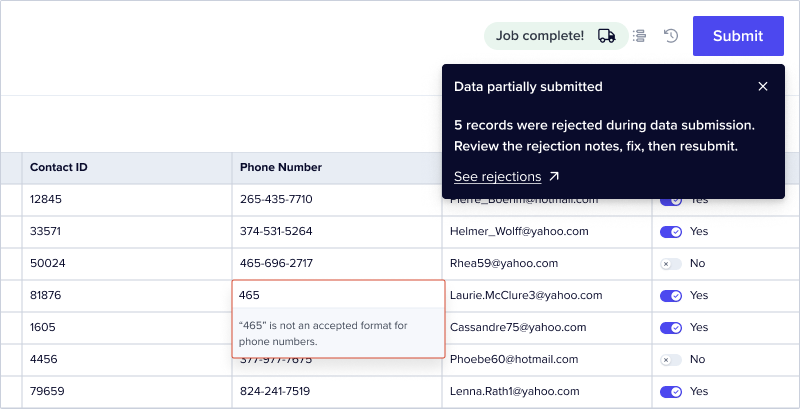util-response-rejection
This plugin handles response rejections returned from an external source.
Installation
| Install | npm i @flatfile/util-response-rejection |
|---|---|
| Source: | View source |
| Package: | @flatfile/util-response-rejection 1k installs |
The @flatfile/util-response-rejection utility is built to handle response rejections from an external source. It is designed to be used as a rejection response handler in an egress listener.

Usage
The purpose of @flatfile/util-response-rejection utility is to handle cases where some Records
were rejected during an egress process. The responseRejectionHandler function is designed to
consume a set of sheets containing rejected Records, and then process the rejected Records by
marking the offending Record fields with the returned rejection message indicating why they were
rejected. If the response value of deleteSubmitted is true, the successfully submitted values
will be deleted from the Sheet. If deleteSubmitted is false or not provided, a Submission Status
field is added to the Sheet and each Record is set to either "Submitted" or "Rejected". In the end,
it returns a total count of all rejected Records across all sheets that can be used in a Job
completion message.
npm i @flatfile/util-response-rejection
import {
responseRejectionHandler,
RejectionResponse,
} from "@flatfile/util-response-rejection";
Response Rejection Handler Function
- The
responseRejectionHandlerfunction is the main entry point of the utility. It takes one parameter:responseRejection: An object containing the rejection data. This object's structure is defined by theRejectionResponseinterface.
- The
responseRejectionHandlerfunction returns aPromisethat resolves to anumberrepresenting the total number of rejected Records across all sheets.
listener.on(
"job:ready",
{ job: "workbook:submitActionFg" },
async ({ context: { jobId } }) => {
// ...
const response = await axios.post("https://webhook.site/...", data, {
headers: {
"Content-Type": "application/json",
},
});
const rejections: RejectionResponse = response.data.rejections;
if (rejections) {
return await responseRejectionHandler(rejections);
}
// ...
}
);
RejectionResponse Interface
The RejectionResponse interface defines the structure of the responseRejection parameter object that is passed into the responseRejectionHandler function. This RejectionResponse's structure is as follows:
{ // RejectionResponse interface
id: string; // The Workbook ID
message: "Success! All records are valid.", // Optional
deleteSubmitted: true, // Optional
sheets: [
{ // SheetRejections interface
sheetId: string; // The Sheet ID
rejectedRecords: [
{ // RecordRejections interface
id: string; // The Record ID
values: [
{
field: string; // The field key
message: string;
}
];
}
// other rejected records...
];
}
// other sheets...
];
}
The message property is optional. If provided, this message will be displayed to the user. This message should be set for either a successful submission or a rejection submission.
The deleteSubmitted property is optional. If true, the successfully submitted values will be deleted from the Sheet. If false or not provided, a Submission Status field is added to the Sheet and each Record is set to either "Submitted" or "Rejected".
Helper Functions
- The code includes a helper functions to assist in the Flatfile Sheet update process:
updateSheet: Updates a Flatfile Sheet by adding the returned rejection messages as error messages on the Records.
Type Definitions
- The code defines three interfaces:
RejectionResponse,SheetRejectionsandRecordRejections. These interfaces represent the structure expected by theresponseRejectionHandler().
